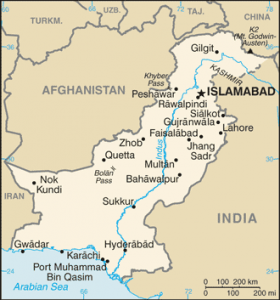NewsDesk @bactiman63
A child aged three months has been paralyzed by wild poliovirus in North Waziristan, in the 18th case from Pakistan this year.

The child suffering from polio-induced disabilities had onset of paralysis on 25th August, the Pakistan National Polio Laboratory at the National Institute of Health confirmed on Saturday.
Besides two cases from Lakki Marwat, all cases from Pakistan this year have been from North Waziristan.
Last week, a positive environmental sample for Poliovirus was detected from Karachi, in addition to four other isolates from Bannu, Peshawar, Swat and Lahore. Karachi, home to communities from across Pakistan, is a historic polio reservoir and remains among areas categorized by the programme at high risk of wild poliovirus transmission.
The humanitarian crisis in wake of the unprecedented floods will pose graver challenges to Karachi and other areas of Pakistan in the foreseeable future, as millions of people are displaced and move to urban centres for refuge. The large-scale movement of people, in addition to the high transmission season for the poliovirus, escalates the risk of wild poliovirus spreading.
“Despite the extreme climatic conditions, the Pakistan Polio Programme conducted immunization campaign wherever possible, and the programme is prepared to restart the campaign in the flood affected areas as soon as it becomes feasible,” Federal Health Minister Qadir Patel said, adding that, “In the given circumstances, the risk of polio has only amplified.”
National Emergency Operations Centre Coordinator, Dr. Shahzad Baig, said the programme has established health camps in 32 districts of the country to support the health needs of flood-affected populations.
These health camps will provide basic clinical services, particularly ensuring treatment of water-borne, vector-borne and skin diseases that are expected to be prevalent. “All routine immunization antigens will also be provided to targeted children and pregnant women,” Dr Baig said.
- Australia: Measles case reported in NSW, 1st case in state in 2 1/2 years
- Brazil chikungunya: 162,000 cases reported in first eight months of 2022
- Florida reports more than 50 meningococcal disease cases in 17 counties
- Anthrax outbreak in Uganda leaves one dead
- Costa Rica reports case of dengue type 4, Third serotype detected in 2022
- Bolivia: 12 cases of visceral leishmaniasis reported in Villa Montes
- Panama malaria cases top 4,000 in 2022

